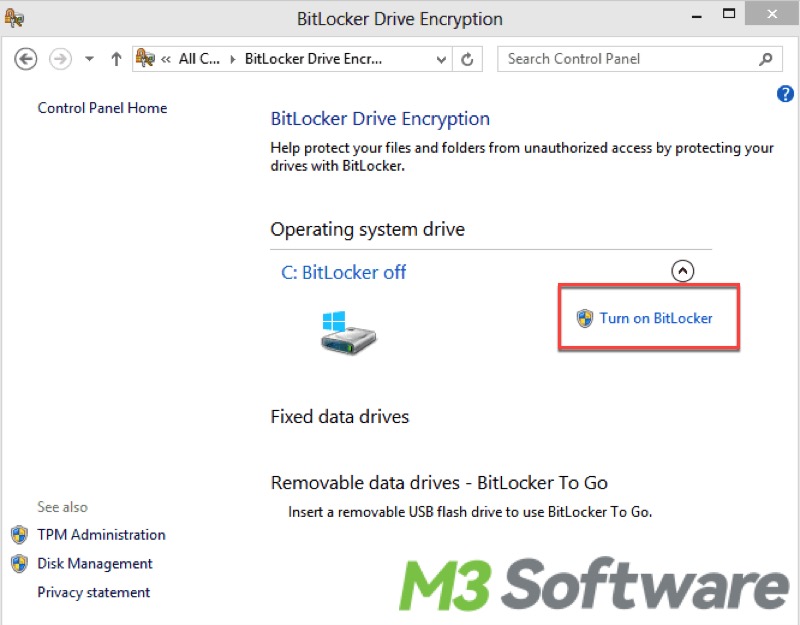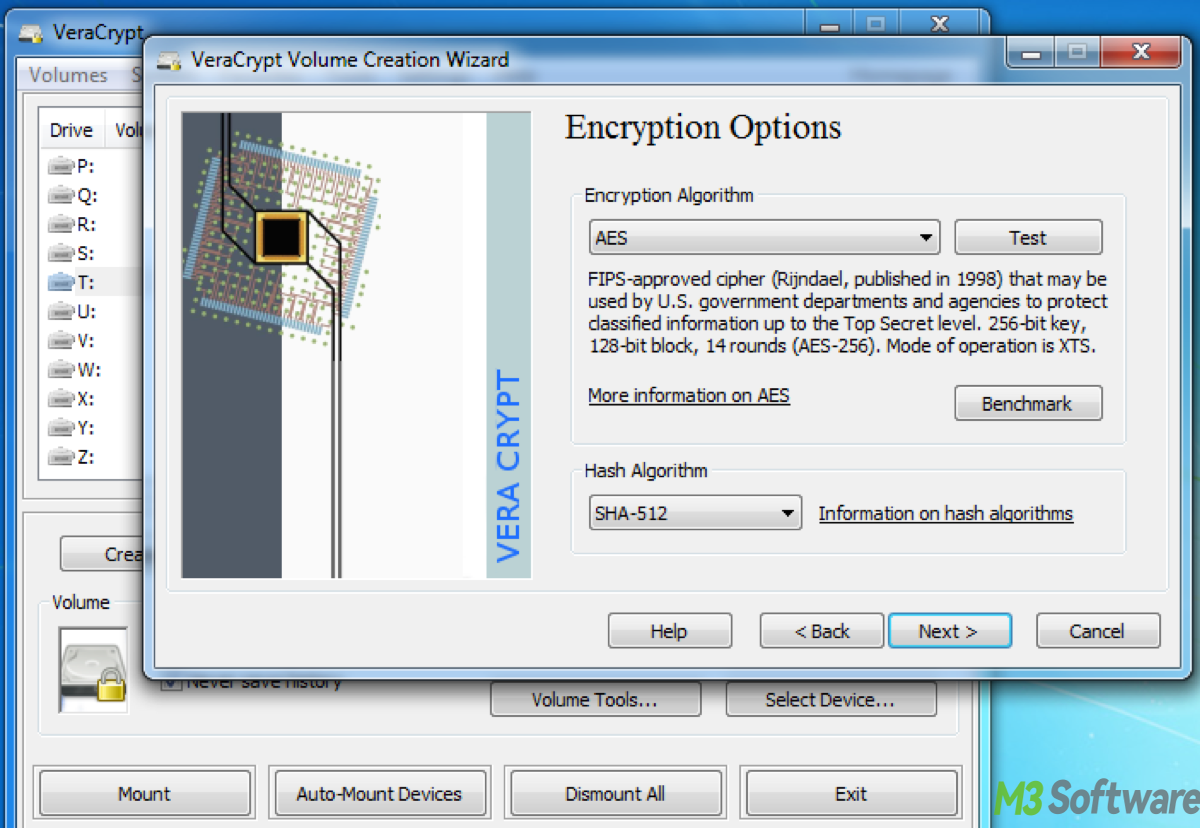Written by
Yuri ZhangRegarding data encryption, BitLocker and VeraCrypt are two of the most prominent options available. Both offer robust protection but differ significantly in how they operate their flexibility, and the platforms they support.
Throughout this article, we will not only compare BitLocker with VeraCrypt, these two encryption tools but also address some common questions concerning performance, speed, and whether they can be used together.
Overview of BitLocker and VeraCrypt
BitLocker is a proprietary encryption tool developed by Microsoft that is exclusively available for Windows Professional and Enterprise editions. It offers full disk encryption and is tightly integrated into the Windows operating system, making it easy for users to enable and manage.
VeraCrypt is an open-source encryption solution available on Windows, macOS, and Linux. It is a more flexible tool than BitLocker, offering options to encrypt not only entire drives but also specific files, folders, and external media through encrypted containers.
Reddit discussion on BitLocker vs VeraCrypt
BitLocker or Veracrypt, which one have you chosen to use? We can agree to disagree. The biggest difference between them is that BitLocker is a Windows-exclusive, fully integrated tool for ease of use, while VeraCrypt is a flexible, open-source, cross-platform solution offering advanced encryption features.
BitLocker vs Veracrypt
by u/13flix in Bitwarden
Another typical annoyance about no BitLocker on the Windows Home version, naturally, the questioner of Reddit wants to use VeraCrypt as an alternative. However, thinking of its complications, it seems daunting. His frustration infected many people. Are there any solutions?
We resolve to offer you the best reference, this article is devised to assist your preferred choice due to mass's pendulous options to encrypt data. To spare your compliance and perplexity worries, iBoysoft DiskGeeker for Windows stands out as a BitLocker encryption tool, which manages encrypted drives well in an exceedingly concise and precise way. And even better, it supports Home version of Windows.
Share this to participate in the discussion and forward your thoughts which is one of a kind.
Can you use BitLocker and VeraCrypt together?
Yes, you can use BitLocker and VeraCrypt together, though they do not directly interact with each other. Here's how you can use them in combination:
BitLocker for full-disk encryption: You can encrypt your system drive or any other drive using BitLocker. This provides a basic layer of security that is simple to use and hardware-accelerated on Windows.
VeraCrypt for encrypted containers: If you need additional encryption on top of BitLocker, you can create VeraCrypt containers (encrypted files that act as virtual drives) within your BitLocker-encrypted drive. This creates a second layer of encryption for sensitive files.
By using both tools, you can leverage BitLocker's full-disk encryption for ease of use and system security while using VeraCrypt for specific files or volumes that require additional protection or cross-platform accessibility.
BitLocker vs VeraCrypt speed and performance
When it comes to performance and speed, both tools have distinct behaviors based on system configurations, the type of drives (HDD or SSD), and encryption algorithms used. Let's dive into how they compare. Here's a table of BitLocker and VeraCrypt performance and features comparison:
| Feature | BitLocker | VeraCrypt |
| Encryption Speed | Highly optimized for Windows, especially with TPM and AES-NI hardware acceleration. Best for full-disk encryption. | Supports multiple encryption algorithms but slower than BitLocker, especially without hardware acceleration. |
| Decryption and Read/Write Speed | Fast decryption and read/write speeds, especially on SSDs. Minimal performance impact. | Slightly slower decryption and read/write speeds, especially with larger files and more complex algorithms. |
| CPU Usage and System Impact | Minimal CPU impact, thanks to hardware-accelerated encryption. | Higher CPU usage, particularly with complex algorithms and older hardware. |
| HDD vs SSD Performance | Performs well on both SSDs and HDDs but has a noticeable advantage on SSDs due to hardware acceleration. | Both perform slower on HDDs, with VeraCrypt being slightly slower overall, especially on larger files. |
| Security Features | TPM integration provides hardware-based security. Easy to use but closed-source. | Advanced security options like hidden volumes and plausible deniability. Open-source for transparency. |
Pros of BitLocker:
BitLocker is the faster option when encrypting entire drives, as it integrates directly with the Windows OS and benefits from hardware acceleration.
One of BitLocker's key advantages is its integration with a Trusted Platform Module (TPM), providing hardware-based security for encryption keys. This makes it very secure against unauthorized access.
BitLocker uses AES encryption (128-bit or 256-bit), and with AES-NI hardware acceleration, encryption is performed at high speed, especially on SSDs.
Pros of VeraCrypt:
VeraCrypt supports multiple encryption algorithms, including AES, Serpent, and Twofish, or combinations of these. This flexibility can result in slower encryption speeds compared to BitLocker, especially if you opt for more complex algorithms.
VeraCrypt shines in creating encrypted containers or volumes, but it is generally slower than BitLocker for full disk encryption due to the absence of hardware acceleration in many cases.
As an open-source tool, VeraCrypt's code is openly available for review by the security community, offering a level of transparency that BitLocker does not. This can be an important factor for those who prioritize complete trust in their encryption software.
Note: VeraCrypt provides advanced features such as hidden volumes and plausible deniability, which BitLocker does not. Hidden volumes allow users to create an encrypted volume within another encrypted volume, providing protection in scenarios where users might be forced to reveal the existence of encrypted data.
Which one is better?
The answer to this question depends on your specific needs:
Choose BitLocker if:
- You use Windows and want a simple, integrated encryption solution that's fast and requires minimal setup.
- You need a reliable full-disk encryption tool with hardware acceleration for high performance.
- You are in a corporate environment where integration with enterprise tools like Active Directory is important.

Choose VeraCrypt if:
- You need cross-platform compatibility across Windows, macOS, and Linux.
- You value open-source transparency and want full control over your encryption settings.
- You need advanced features like hidden volumes or encrypted containers that BitLocker doesn't offer.
- You require encryption on external drives or individual files and folders that can be transported across different operating systems.

Conclusion: BitLocker vs VeraCrypt—Which should you choose?
BitLocker is the best choice for users looking for an easy-to-use, fast, and integrated encryption solution on Windows. Its native support for hardware acceleration and TPM integration makes it ideal for full-disk encryption on modern Windows systems with minimal performance overhead.
On the other hand, VeraCrypt is a better option if you require more control over your encryption methods, need cross-platform support, or want to use advanced features like hidden volumes. While it may be slower in terms of encryption and decryption speeds, its flexibility and open-source nature make it highly trusted by security-conscious users.
Ultimately, both BitLocker and VeraCrypt have strengths, but they also come with limitations. BitLocker's closed-source nature, lack of flexibility, and Windows-only support, and VeraCrypt's more complex setup process and performance hit may make it less appealing. In this circumstance, iBoysoft DiskGeeker is a better choice.
Also read How to Get BitLocker For Windows 7/8/10/11
Share this and get better at your data security.
